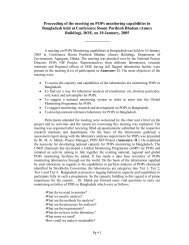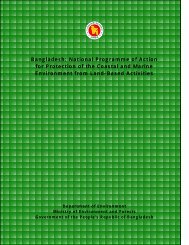Draft CMP HH - the Department of Environment
Draft CMP HH - the Department of Environment
Draft CMP HH - the Department of Environment
Create successful ePaper yourself
Turn your PDF publications into a flip-book with our unique Google optimized e-Paper software.
Coastal and Wetland Biodiversity Management Project BGD/99/G31<br />
Hakaluki Haor <strong>Draft</strong> Conservation Management Plan<br />
providing a steady and stable source <strong>of</strong> additional income for <strong>the</strong> local community in particular<br />
poorer families. Selection should also be based on:<br />
� Local preferences.<br />
� The adaptive capacity <strong>of</strong> each potential crop particularly in relation to local climatic and<br />
bio-physical conditions (drought, flood, wind, soil, pests and disease etc)<br />
• Develop a comprehensive plan aimed at maximising production from homestead gardens while<br />
maintaining <strong>the</strong> ecological integrity <strong>of</strong> <strong>the</strong> ECA<br />
• Work with local communities to initiate activities to increase <strong>the</strong> number, type, and yield <strong>of</strong><br />
existing horticultural crops in homestead gardens<br />
• Based on a detailed analysis <strong>of</strong> data collected, introduce new and economically viable<br />
horticultural varieties as a means <strong>of</strong> increasing food security, generating income, and ultimately<br />
reducing pressure <strong>of</strong> <strong>the</strong> ECA<br />
• Identify alternatives for communities whose gardens become inundated during <strong>the</strong> flooding<br />
season<br />
• Engage and help establish as required cooperatives especially involving women which support<br />
well managed and economically viable homestead gardens<br />
Primary Outcome/ Output<br />
• Homestead gardens are making a significant contribution to household incomes and dependence<br />
on <strong>the</strong> natural resources <strong>of</strong> <strong>the</strong> ECA is minimised<br />
• Homestead gardens are managed sustainably and without <strong>the</strong> use <strong>of</strong> agro-chemicals<br />
Constraints<br />
• Local communities may resist <strong>the</strong> introduction <strong>of</strong> new crops<br />
• Annual flooding may pose a significant hurdle to overcome<br />
• Financing <strong>the</strong> introduction <strong>of</strong> new horticultural crops may prove to be quite expensive<br />
7.2.12 Irrigation<br />
Water is seemingly abundant in <strong>the</strong> Haor especially during <strong>the</strong> months <strong>of</strong> rain when <strong>the</strong> ECA floods<br />
for up to five months <strong>of</strong> <strong>the</strong> year. During <strong>the</strong> winter months, however, <strong>the</strong> landscape changes<br />
dramatically and what was just a large inland freshwater lake becomes fertile ground for<br />
agricultural activity. To irrigate newly planted crops farmers draw water from a variety <strong>of</strong> sources<br />
including canals, rivers, beels, and underground water tables.<br />
The current system for <strong>the</strong> irrigation <strong>of</strong> horticultural and agricultural crops within <strong>the</strong> ECA is,<br />
however, largely unregulated and as a result <strong>the</strong> indiscriminate use <strong>of</strong> water is significantly<br />
impacting <strong>the</strong> ecology <strong>of</strong> <strong>the</strong> Haor. The diversion <strong>of</strong> waterways and pumping <strong>of</strong> beels for irrigation<br />
purposes is, for example, disrupting fish migratory pathways and degrading habitats for fish,<br />
wildlife, and aquatic vegetation.<br />
At this stage, more information concerning current irrigation practices is required in order to make a<br />
proper assessment <strong>of</strong> <strong>the</strong> impact on Haor ecology. Data collection should be undertaken in close<br />
collaboration with local farmers, <strong>the</strong> Water Development Board (WDB), and Upazilla Agriculture<br />
Officers.<br />
Prepared by UNOPS Consultant Mr. Sulma Warne August/ September 2005 for Project BGD/99/G31 31





